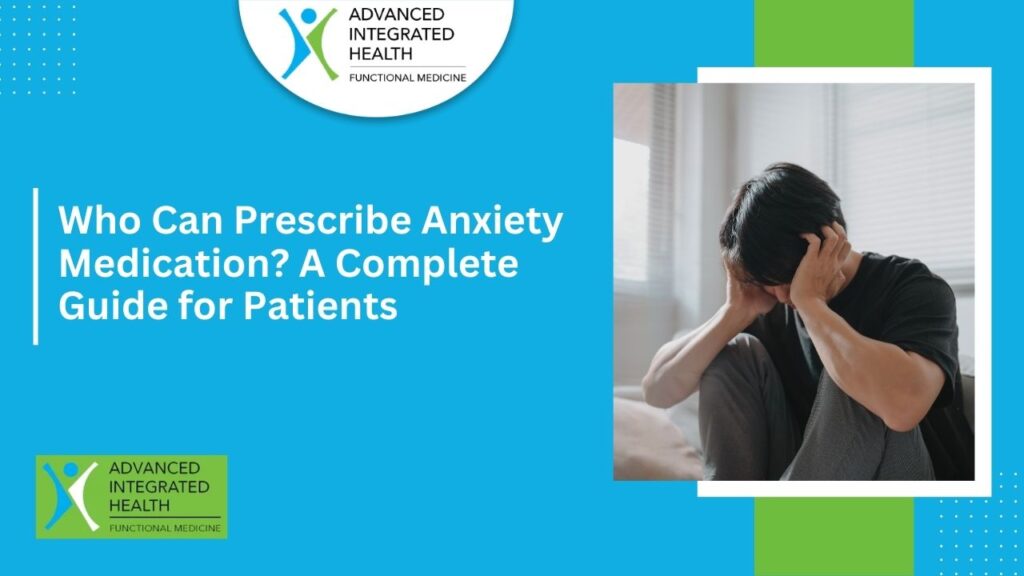Anxiety disorders are one of the most common psychological conditions, affecting millions of individuals worldwide. Characterized by persistent feelings of excessive worry, fear, and distress, anxiety can severely impact daily life, relationships, and overall well-being. While lifestyle changes and therapy can help manage anxiety, many individuals require medication to alleviate symptoms and regain control.
But which healthcare professionals can prescribe anxiety medication? In this article, let’s explore the professionals authorized to prescribe medication, the role of primary care physicians, psychiatrists, and psychiatric nurse practitioners, and how individuals can find the right provider for their needs.
Understanding Anxiety
Anxiety is among the most common affecting individuals of all ages. These disorders are often characterized by persistent feelings of excessive worry, fear, and distress that can significantly disrupt daily life. Anxiety can manifest in various forms, including generalized anxiety disorder (GAD), panic disorder, social anxiety, and specific phobias.
Physical symptoms such as rapid breathing, sweating, dizziness, and heart palpitations frequently accompany the mental strain of anxiety. Panic attacks, for example, can lead to intense fear and physical discomfort, which may cause a person to feel as though they are losing control or even experiencing a heart attack.
In addition to these immediate physical symptoms, anxiety can also have long-term impacts on both mental and physical health. Chronic anxiety can lead to sleep disturbances, digestive issues, and an increased risk of cardiovascular problems, making it crucial to address both the psychological and physical aspects of anxiety.
Impact on Daily Life and Treatment Options
Anxiety disorders can interfere with work, relationships, and everyday activities. Those affected may find it difficult to perform tasks that once seemed manageable, leading to decreased quality of life. This is why seeking professional help is so important. A treatment plan for anxiety typically involves a combination of approaches, such as therapy, medication, and lifestyle changes.
While lifestyle changes such as regular exercise, meditation, and stress management techniques like breathing exercises can help alleviate symptoms, many individuals require additional treatment in the form of medication. Anxiety medication, prescribed by professionals like primary care physicians or psychiatrists, can provide significant relief. These medications, including anti-anxiety medication and selective serotonin reuptake inhibitors (SSRIs), work to balance the chemicals in the brain that affect mood and anxiety levels. Prescribing anxiety medication can often be the next step in a comprehensive treatment plan for those struggling with severe symptoms.
Who Can Prescribe Anxiety Medication?
When it comes to treating anxiety, various healthcare providers are authorized to prescribe anxiety medication.
Primary Care Physicians
Primary care doctors, including those with a specialization in internal medicine, are often the first point of contact for individuals experiencing symptoms of anxiety. They are trained to diagnose mental health conditions, including anxiety, and can provide treatment options such as medication management.
In many cases, primary care physicians can prescribe anxiety meds directly, especially for conditions like generalized anxiety disorder (GAD) or panic attacks. However, if the anxiety symptoms are severe or require specialized attention, primary care doctors may refer patients to a psychiatrist or psychiatric nurse practitioner for further evaluation and treatment.
Mental Health Specialists
Psychiatrists, who are medical doctors specializing in psychological well-being, are another key group who can prescribe medication for anxiety.
Psychiatrists have in-depth training in mental health treatment, making them highly qualified to prescribe anti-anxiety medication, including long-standing medications like benzodiazepines or SSRIs. These professionals are skilled in evaluating mental health issues and can recommend the best-fitting medication based on an individual’s specific needs.
Advanced Practice Providers
Psychiatric nurse practitioners (NPs) also have the authority to prescribe anxiety medication. NPs are advanced practice nurses with specialized training in psychological care. They are equipped to provide psychiatric evaluations, diagnose psychological conditions, and prescribe both short-term and long-term anxiety treatments, including medication.
In addition to these healthcare providers, psychological well-being facilities and counseling centers may also play a role in the treatment of anxiety. Licensed clinical social workers (LCSWs) and psychologists, although unable to prescribe medication directly, can provide valuable services such as anxiety therapy, which can work alongside prescription medication to treat anxiety effectively.
Online Options for Anxiety Treatment
In today’s digital age, online options for anxiety treatment are becoming increasingly popular.
Virtual Psychiatry Services
Virtual psychiatry, also known as telehealth, offers a convenient way for individuals to access psychological care from the comfort of their own homes. This can be especially helpful for those with busy schedules, limited access to in-person providers, or concerns about the stigma surrounding psychological treatment.
Remote Treatment Options
Online platforms offer a variety of services for managing anxiety. Virtual psychiatry allows patients to consult with licensed professionals, such as psychiatrists and psychiatric nurse practitioners, who can assess their symptoms, provide diagnoses, and prescribe anxiety medication if necessary. These services are typically provided through secure video calls, making receiving psychological evaluations and prescriptions remotely possible.
Telemedicine and Primary Care
For those seeking primary care treatment, online primary care providers can also offer diagnosis and treatment for anxiety symptoms. Through telemedicine appointments, patients can discuss their symptoms of anxiety, receive guidance on treatment options, and even get prescriptions for anxiety medication without having to visit a doctor’s office. Many online primary care providers have access to the same medication management tools and treatment plans as traditional in-person doctors, making them a viable option for those seeking psychological care.
Online Therapy Platforms
Additionally, online therapy platforms have gained popularity as a resource for managing anxiety. These platforms connect individuals with licensed therapists or counselors who specialize in anxiety-related disorders. Through online therapy, patients can receive treatment for anxiety, including cognitive-behavioral therapy (CBT), which is known for its effectiveness in helping individuals manage symptoms of anxiety. Therapy can be conducted via video, phone, or text, offering flexibility in how patients receive care.
The rise of online psychological well-being services has made it easier than ever to access treatment for anxiety. Whether through online therapy, virtual psychiatry, or telehealth primary care, individuals seeking help for anxiety now have more options than ever to find effective, accessible care.
How to Get Prescribed Anxiety Medication
Step 1: Initial Consultation Process
Getting prescribed anxiety medication begins with a consultation with a healthcare provider. The process typically starts with an appointment where you discuss your symptoms of anxiety, medical history, and any other relevant health information. It’s important to be open and honest during this conversation so your provider can accurately assess your situation and recommend the most appropriate treatment.
Step 2: Diagnosis and Evaluation
When you meet with your provider, they will first evaluate your symptoms to determine if you have an anxiety disorder. Anxiety disorders, such as generalized anxiety disorder (GAD) or panic disorder, often present with symptoms like persistent worry, physical symptoms (such as rapid heart rate or sweating), and interference with daily life. If your provider suspects you have an anxiety disorder, they may recommend anxiety medication to help alleviate symptoms.
Step 3: Treatment Planning
During this appointment, your provider may ask questions about the severity of your anxiety, the impact it has on your daily life, and any other mental or physical health concerns. This helps them determine exactly which medication might best fit your needs. Providers may prescribe anti-anxiety medication like benzodiazepines for short-term relief or SSRIs and other antidepressants for long-term treatment. The decision on which medication to prescribe depends on factors like the type of anxiety, the severity of symptoms, and your medical history.
Step 4: Ongoing Care and Monitoring
Once the medication is prescribed, your provider will typically monitor your progress. This is called medication management, where your doctor ensures the medication is effective and adjusts dosages if needed. You may need follow-up appointments to discuss how well the medication is working and whether any side effects are present. Your healthcare provider may also recommend complementary treatments, such as anxiety therapy, breathing exercises, or lifestyle changes to further support your psychological well-being treatment plan.
For individuals considering anxiety medication, it’s essential to work closely with your provider to create a treatment plan tailored to your unique needs and situation.
Finding the Right Doctor or Provider
When seeking treatment for anxiety, one of the most important steps is finding the right healthcare provider to guide you through your treatment options. The provider you choose will play a critical role in diagnosing and managing your anxiety, so it’s essential to find someone you feel comfortable with and who has the expertise to help you manage your condition.
Primary Care Options
First, you’ll need to decide which type of provider is best for you. Primary care doctors are often the first point of contact for individuals seeking treatment for anxiety. They are trained to recognize signs of anxiety and can provide an initial evaluation.
If necessary, they may refer you to a mental health specialist, such as a psychiatrist or psychiatric nurse practitioner, for a more comprehensive evaluation and prescription of anxiety medication. Primary care physicians (PCPs) can prescribe anxiety medication, but if they feel that a specialist is needed for a more accurate diagnosis or treatment, they may refer you to someone with expertise in psychological well-being.
Specialized Mental Health Care
Psychiatrists are medical doctors who specialize in diagnosing and treating psychological disorders, including anxiety disorders. They can prescribe anxiety medication and offer additional treatment options, such as psychotherapy or other forms of therapy. Psychiatrists have extensive training in the psychiatric aspects of mental health and are often the most knowledgeable professionals when it comes to medication management for anxiety.
Psychiatric nurse practitioners are another valuable resource. They are advanced practice nurses with specialized training in mental health and are licensed to prescribe medication. They can work alongside psychiatrists and other healthcare providers to create and manage treatment plans for individuals struggling with anxiety.
Treatment Delivery Options
It’s also important to consider whether you prefer in-person visits or are open to online care options. Many providers, including psychiatrists and psychiatric nurse practitioners, offer virtual consultations and telehealth appointments. These online platforms can provide greater accessibility, especially for individuals with busy schedules or those living in rural areas. Online platforms also allow you to connect with psychological professionals who may not be available locally.
Making the Right Choice
Regardless of the type of provider, it’s important to choose someone who listens to your concerns, understands your symptoms, and works with you to create a personalized treatment plan. Don’t hesitate to ask about their experience with anxiety treatment, their approach to prescribing medication, and how they manage the side effects of anxiety medications. Finding the right provider can make a world of difference in your journey toward managing your anxiety effectively.
Why Seek Help for Anxiety?
Seeking help for anxiety is essential for anyone who experiences the persistent worry, fear, or distress that characterizes anxiety disorders. Although it’s normal to feel anxious occasionally, when these feelings become overwhelming and start interfering with daily life, seeking professional help is crucial.
Health Implications
Anxiety disorders, such as generalized anxiety disorder (GAD), panic disorder, and social anxiety disorder, can significantly impact a person’s mental and physical health. These conditions can cause a range of physical symptoms, including headaches, fatigue, and digestive issues, and can also make it difficult to focus, maintain relationships, or perform well at work or school. In severe cases, untreated anxiety can lead to depression and other mental health problems.
Benefits of Treatment
The benefits of seeking help for anxiety go beyond alleviating distressing symptoms. Treatment for anxiety, whether through medication, therapy, or a combination of both, can help individuals regain control over their lives and improve their overall quality of life. For instance, anxiety medication can relieve the physical symptoms of anxiety, such as rapid heartbeat, sweating, and dizziness, making it easier to cope with anxiety-inducing situations. Therapy, particularly cognitive-behavioral therapy (CBT), can help individuals understand the root causes of their anxiety and develop coping mechanisms to manage stress more healthily.
Long-term Wellness
Taking the step to seek help is not a sign of weakness but a proactive measure to protect your well-being. Many people hesitate to seek treatment because they fear judgment or believe they should be able to manage their anxiety on their own. However, professional help provides the expertise, support, and resources necessary to manage anxiety effectively.
Seeking help for anxiety improves psychological well-being and promotes better physical health. By treating anxiety, individuals can reduce the strain on their bodies caused by chronic stress, leading to improved overall health. Whether through medication, therapy, or both, seeking professional care is a key step in managing anxiety and reclaiming a sense of control in daily life.
Conclusion
Anxiety disorders affect millions of people worldwide, but the good news is that treatment is available. A variety of healthcare providers, including primary care doctors, psychiatrists, psychiatric nurse practitioners, and online therapy services, can prescribe anxiety medication and offer support. While the type of provider may depend on your specific needs, understanding who can prescribe medication for anxiety and what treatment options are available can help you take the first steps toward managing your anxiety effectively.
If you’re struggling with anxiety, Advanced Integrated Health is here to help. Our team of healthcare providers specializes in mental health treatment and can guide you through your options for managing anxiety. Visit Advanced Integrated Health to learn more about how we can help you find the right treatment and regain control of your life.
Citations
- Leonard, J. (2023, December 22). Everything you need to know about anxiety medications. https://www.medicalnewstoday.com/articles/323666
- Carlson, L. (2023, July 24). Who can prescribe anxiety medication? MyWellbeing. https://mywellbeing.com/therapy-101/who-can-prescribe-anxiety-medication
- Booth, S. (2024, June 29). Understanding generalized anxiety Disorder. WebMD. https://www.webmd.com/anxiety-panic/understanding-anxiety-treatment

Dr. Bob was born and raised in Florham Park, New Jersey.
He loved the philosophy of vitalism, which teaches about the incredible, innate intelligence of our bodies and its power to self-heal when given the opportunity.



